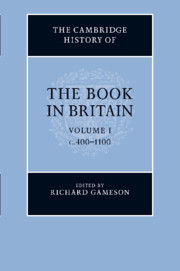Book contents
- Frontmatter
- 1 From Vindolanda to Domesday: the book in Britain from the Romans to the Normans
- PART I THE MAKING OF BOOKS
- PART II THE CIRCULATION OF BOOKS
- PART III TYPES OF BOOKS AND THEIR USES
- PART IV COLLECTIONS OF BOOKS
- 27 Patrick, apostle of the Irish
- 28 The library of Iona at the time of Adomnán
- 29 Literacy in Anglo-Saxon England
- 30 Aldhelm’s library
- 31 The library of the Venerable Bede
- 32 The library of Alcuin’s York
- 33 The library of Cynewulf
- 34 King Alfred and his circle
- 35 Ælfric’s library
- 36 The library of Byrhtferth
- 37 The library of Wulfstan of York
- 38 Rhygyfarch ap Sulien and Ieuan ap Sulien
- PART V CODA
- Bibliography
- Concordance of named manuscripts
- Index of manuscripts
- General Index
- Plate 4.1: The Lindisfarne Gospels"
- Plate 5.1: The Lichfield/St Chad Gospels"
35 - Ælfric’s library
from PART IV - COLLECTIONS OF BOOKS
Published online by Cambridge University Press: 28 March 2012
- Frontmatter
- 1 From Vindolanda to Domesday: the book in Britain from the Romans to the Normans
- PART I THE MAKING OF BOOKS
- PART II THE CIRCULATION OF BOOKS
- PART III TYPES OF BOOKS AND THEIR USES
- PART IV COLLECTIONS OF BOOKS
- 27 Patrick, apostle of the Irish
- 28 The library of Iona at the time of Adomnán
- 29 Literacy in Anglo-Saxon England
- 30 Aldhelm’s library
- 31 The library of the Venerable Bede
- 32 The library of Alcuin’s York
- 33 The library of Cynewulf
- 34 King Alfred and his circle
- 35 Ælfric’s library
- 36 The library of Byrhtferth
- 37 The library of Wulfstan of York
- 38 Rhygyfarch ap Sulien and Ieuan ap Sulien
- PART V CODA
- Bibliography
- Concordance of named manuscripts
- Index of manuscripts
- General Index
- Plate 4.1: The Lindisfarne Gospels"
- Plate 5.1: The Lichfield/St Chad Gospels"
Summary
Ælfric of Eynsham, also known in the past as Ælfric Grammaticus, was a pupil of St Æthelwold and educated at Winchester, where he apparently remained until the age of thirty or so, with access to the no doubt extensive resources of the Old Minster and other centres there. But it was only after he left Winchester around 987 and moved to the newly founded (or refounded) monastery at Cerne Abbas that he began his prolific writing programme, and for this he was presumably mainly reliant on the much more limited collection of books available to him at the new foundation and subsequently at Eynsham, another newly founded monastery to which he moved as abbot in 1005. He identifies his sources, at least by author, quite frequently, and the often close verbal parallels between his vernacular wording and that of numerous Latin texts suggests that he was not simply relying on memory. No record survives of him requesting books from other places or visiting other places to consult them, though he evidently was travelling a good deal, at least later in life, and could have had the opportunity to consult books at Winchester. But the fact that Wulfstan, bishop of Worcester and archbishop of York, consulted him on matters of canon law around 1002 suggests that he was not thought to be cut off from the kinds of resources that large cathedrals could boast.
The nature of his writings, concentrated on vernacular homilies, saints’ lives, biblical paraphrase and pastoral letters, strictly limits the range of works that he can be shown to have known. 1 Given his education at Winchester it is inconceivable that he did not know a range of classical and later Latin poetry of the kind drawn on by other writers of the time, 2 but there is not a hint in his writings (unless we accept the recent argument that he himself was the author of the Excerptiones de Prisciano, which formed the basis of his own vernacular Grammar of Latin, and which contains numerous quotations from the classical poets). He knew Bede’s metrical Life of St Cuthbert, and his readiness to use it rather than relying on the two prose Lives suggests that he was perfectly comfortable with Latin verse, but the only other poem he can be shown to have used is a passage of Sedulius which he found quoted in a homily by Bede.
Keywords
- Type
- Chapter
- Information
- The Cambridge History of the Book in Britain , pp. 679 - 684Publisher: Cambridge University PressPrint publication year: 2011
- 1
- Cited by

